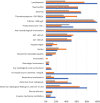Multisystem inflammatory syndrome in children associated with COVID-19 in 101 cases from Turkey (Turk-MISC study)
- PMID: 35199895
- PMCID: PMC9115147
- DOI: 10.1111/jpc.15913
Multisystem inflammatory syndrome in children associated with COVID-19 in 101 cases from Turkey (Turk-MISC study)
Abstract
Aim: Multisystem inflammatory syndrome in children (MIS-C) may cause shock and even death in children. The aim of this study is to describe the clinical features, laboratory characteristics and outcome of children diagnosed with MIS-C in 25 different hospitals in Turkey.
Methods: The retrospective study was conducted between 8 April and 28 October 2020 in 25 different hospitals from 17 cities. Data were collected from patients' medical records using a standardised form. Clinical and laboratory characteristics and outcomes according to different age groups, gender and body mass index percentiles were compared using multivariate logistic regression analysis.
Results: The study comprised 101 patients, median age 7 years (interquartile range (IQR) 4.6-9.3); 51 (50.5%) were boys. Reverse-transcriptase polymerase chain reaction (PCR) assay was positive in 21/100 (21%) patients; 62/83 (74.6%) patients had positive serology for SARS-CoV-2. The predominant complaints were fever (100%), fatigue (n = 90, 89.1%), and gastrointestinal symptoms (n = 81, 80.2%). Serum C-reactive protein (in 101 patients, median 165 mg/L; range 112-228), erythrocyte sedimentation rate (73/84, median 53 mm/s; IQR 30-84) and procalcitonin levels (86/89, median 5 μg/L; IQR 0.58-20.2) were elevated. Thirty-eight patients (37.6%) required admission to intensive care. Kawasaki disease (KD) was diagnosed in 70 (69.3%) patients, 40 of whom had classical KD. Most patients were treated with intravenous immunoglobulin (n = 92, 91%) and glucocorticoids (n = 59, 58.4%). Seven patients (6.9%) died.
Conclusion: The clinical spectrum of MIS-C is broad, but clinicians should consider MIS-C in the differential diagnosis when persistent fever, fatigue and gastrointestinal symptoms are prominent. Most patients diagnosed with MIS-C were previously healthy. Immunomodulatory treatment and supportive intensive care are important in the management of cases with MIS-C. Glucocorticoids and intravenous immunoglobulins are the most common immunomodulatory treatment options for MIS-C. Prompt diagnosis and prompt treatment are essential for optimal management.
Keywords: COVID-19; Kawasaki disease; MIS-C; child; shock.
© 2022 Paediatrics and Child Health Division (The Royal Australasian College of Physicians).
Figures



 , 0‐5 yr;
, 0‐5 yr;  , 5‐12;
, 5‐12;  , 12yr
, 12yr
References
-
- Moraleda C, Serna‐Pascual M, Soriano‐Arandes Soriano‐Arandes A, Simó S, Epalza C, Santos M, Grasa C, Rodríguez M, Soto B, Gallego N, Ruiz Y, Urretavizcaya‐Martínez M, Pareja M, Sanz‐Santaeufemia FJ, Fumadó V, Lanaspa M, Jordan I, Prieto L, Belda S, Toral‐Vázquez B, Rincón E, Gil‐Villanueva N, Méndez‐Echevarría A, Castillo‐Serrano A, Rivière JG, Soler‐Palacín P, Rojo P, Tagarro A, EPICO‐AEP Working Group . Multi‐inflammatory syndrome in children related to SARS‐CoV‐2 in Spain. Clin. Infect. Dis. 2021;72:397–401. - PMC - PubMed
MeSH terms
Substances
Supplementary concepts
LinkOut - more resources
Full Text Sources
Medical
Research Materials
Miscellaneous

